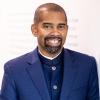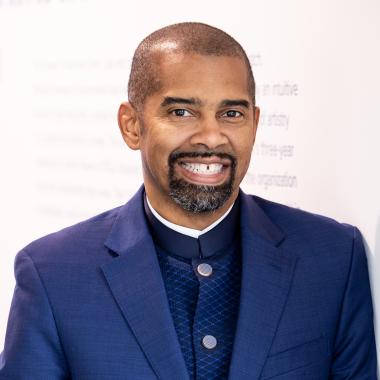Audacious Hope. Ambitious Actions.

A conversation between NCG's President and CEO Dwayne S. Marsh with NCG's Board Chair and Executive Vice President at the California Wellness Foundation Richard Tate.
During our Annual Conference, NCG's President and CEO Dwayne S. Marsh shared a very personal story, one that helped shape who he is today. To celebrate Dwayne at the helm for just over a year now, Richard spoke with him to dive into the story. Read through the conversation to hear more about why Dwayne centers racial equity, what the past year has meant to him, his hopes for the NCG community, and what he needs from you to get us there.
Richard Tate: Dwayne, at our annual conference you told a story I’d never heard, that framed your understanding at a young age of what the stakes were in the ongoing movement to advance racial justice.
Dwayne S. March: Thanks, Richard. It’s always helpful to call ancestors into a reflective space, so I’ll ask my parents to join us. My father is now 87 and still crusades for racial justice in the City he has served for more than 60 years, Richmond Virginia. My mother was an amazing presence that elevated our entire family in more ways than I can describe until she finished her life journey last September 1 – the day I formally joined NCG.
But the stage of my story is set at a much earlier time – it’s June 30, 1982. A packed City Council chamber anxiously awaits the roll call vote of its nine Councilors to determine who will be the next mayor of Richmond. I am in the room, and at thirteen old enough to recognize that something momentous is about to happen, but young enough not to understand all of the nuance that drives it. For five years, the conservative white minority that lost power with the ascension of the first Black mayor in the City’s history, is about to regain that authority. They are leveraging the newest council member, another Black man, to vote with them and depose this controversial figure that upended The Way Things Work in the former Capitol of the Confederacy. That controversial figure and first Black mayor by the way, is my father.
All I know is that if the vote goes as planned, maybe it means things might get back to what passed for normal then. Perhaps the unmarked detective details at the house will subside, or classrooms will cease to be political crucibles, or the feeling that every police officer you encounter will either be a fierce ally – or quite the opposite.
To make a long story medium, the vote takes place, the new council member votes for himself as Mayor, the four white councilors join ranks, and Henry L. Marsh III is no longer the first African American Mayor of Richmond, Virginia. As literally half the audience bursts into uproarious applause and the other half into deafening boos (a very peculiar sound), my Uncle Bruce quietly leans over to my mother and says something softly in her ear that only the three of us hear, and that I will never forget:
That vote just saved your husband’s life.
I share this story because we have to remember just how fiercely those who came before us struggled in the fight for racial justice. Because we need to honor what they risked, and what they gave up – and trust me, my parents gave up a lot.
Richard Tate: That’s a lot to process as a young teenager…
Dwayne S. Marsh: Even as a Black man in America, I have experienced privilege, interwoven with the personal and structural adversity that I’ve endured. I’ve leveraged that privilege into an Ivy League education, an advanced degree, and more years than I ought to admit as a white-collar worker in nonprofit and government service. And for all of that, my affluence and influence could be snuffed out in the time it takes for a traffic stop to go wrong. That is just one irony of being Black in America. That’s not an optional lesson – it’s something you internalize at an early age.
Richard Tate: Flash forward from the eighties to the twenties… you’ve now been at this work for nearly thirty years. What drives you to continue this pursuit of racial equity?
Dwayne S. Marsh: It’s about those whose journey has been without privilege. The adversity that is reality for far too many of our Black and Brown compatriots came into crystalline focus for a large part of this sector and society in 2020. For others, it was just another painful endorsement of the world that is.
That world does not have to be. Our job – our job is to bridge the world we imagine, the one we deserve to see to the sobering reality in which we live, the one that needs fundamental change. And that is a privilege I willingly acknowledge – the work itself. How many people in our society can honestly say that their livelihood has the potential to change lives? This is a gift we must steward gratefully, and with great care.
Richard Tate: We never could have predicted that your arrival at NCG would coincide with an intense period of racial reckoning for our nation and its largest civil rights uprising. You came to NCG with a mission to realize the organization’s focused pursuit of racial equity.
Dwayne S. Marsh: Some in our community may approach this as a job, but I know many, most, see this as avocation, or even a calling. And the Moment is calling out loud and clear. Calling for unprecedented action.
Therein lies a conundrum. We work in institutions measured in their perpetuity – is it any wonder that rapid transformation proves challenging, that inertia frequently rules the day?
That said, northern California has long been acknowledged for its progressive stance within philanthropy. Our membership needs to embrace that mantel and build on it in the months to come. And we’ve seen wonderful examples of a field stretching its practice, doing things that are extraordinary.
To change the trajectory of the sector, though, we need to raise the floor and blow out the ceiling on our efforts. The extraordinary needs to become Standard Operating Procedure. We need to bring our best selves, because when the field does that, it can actually be pretty amazing. Through our programming, convening, training, a field-building, NCG can help unleash the full potential of our collective power for impact.
Richard Tate: It’s been a year of you at the helm! I’m not sure where that time went. What have you most enjoyed, and what are you most looking forward to in the year ahead?
Dwayne S. Marsh: All of it. It’s been a truly remarkable experience. Each morning I ask myself ‘what am I going to do that’s going to sharpen your practice as a grantmaker?’ That’s what it’s all about.
The short answer is everything is in my power. In my 30th year in the Bay Area nonprofit ecosystem, and first in this position, I know this is where I am supposed to be.
I know because of a staff fully committed to centering racial equity in how we fulfill our role as Northern California’s premiere philanthropy serving organization; and a sensational board prepared to push the organization, embody the change we need to see, infuse next-level thinking into our strategy, and from that fateful first day of my arrival, to have my back.
I know because of a membership not content to maintain our region’s status quo that recognizes that a return to the normal we knew would represent a failure of leadership.
I firmly believe that we can cede power to those who have been denied it for generations so that they can shape the future they deserve, and that this organization will play a serious role in making that happen.
That’s why I am here. I hope that’s why NCG’s community is here.
It’s an audacious hope, with ambitious actions we’re discovering aren’t as risky as we thought. Of NCG’s community in this journey, I ask only this: start wherever you are, but start. And join us. We can be together to build the region we deserve. We can be together to transform the economy and society. We can be together for good.
Richard Tate: Thank you, I am looking forward to our continued work together.
My pleasure, Richard. And trust me – we are just getting started.


